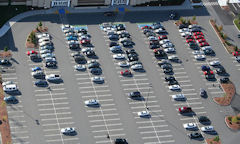Parking may be the most under-appreciated factor driving urban economics. Street parking takes up valuable space that could be used for bicycle lanes and sidewalks. Parking lots and garages create walkability dead zones in the urban fabric. And drivers add to congestion in busy urban centers as they drive around and look for parking spaces, spending as much as eight minutes on average, by some estimates.
Fortunately, the advent of the GPS-enabled smart phone is revolutionizing the parking industry. Parking will never be the same. A couple of straws in the wind…
First, consider Parkopedia, which claims to track 25 million parking spots in 6,300 towns in 40 countries in its database (the number increases every few seconds as new parking spaces are added to the database, which you can track in real time on the home page):
Parkopedia combines … two concepts in order to allow people to find the cheapest and most convenient parking available, no matter where they are or where they are going. Our crazy-about-parking (or maybe crazy-about-not-getting-parking-tickets!) users contribute information about street parking, parking meters, garages and even private driveways that are for rent.
We then apply a bit of magic and show you the closest and cheapest available parking in your chosen area on the dates you have selected. We now have over [25] million parking spots listed and the number is growing every day!
Parkopedia generates revenue by selling mobile apps for $1.99 (iPhone version).
Second, Baltimore-based Parking Panda has just raised $4.8 million in private equity funding. That company helps city dwellers make money by renting their garages, driveways or other property in neighborhoods where parking can be hard to find. An English company, ParkatmyHouse.com, and Chicago-based ParkWhiz.com serve the same niche. They make money by capturing a share of each transaction.
The potential exists for new enterprises to convert what had been unrecognized parking capacity (garages, driveways, alleys, front lawns, whatever) into functionally usable parking space. That’s a god-send for big events like concerts and college football games, which generate parking overflow. It’s bad news for parking lot owners who will see a lot more competition for their product. But it’s good news for fans of urban density: Insofar as the technology shrinks demand for acreage-hogging parking lots and ugly parking decks, space dedicated to parking will be convertible to other, more productive uses.
Listen up, local governments! City councils need to pay close attention to this trend. Parking apps represent a sea change in the supply and demand for parking. Municipal parking policies, which have seen minimal change for decades, will need revamping. Savvy cities will exploit this technology to convert unproductive, parking-related land uses to productive, tax-generating land uses while simultaneously making their neighborhoods and business districts more attractive.



